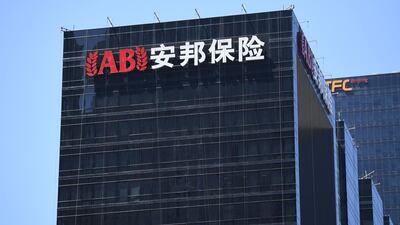A Chinese court accused the former head of troubled Anbang Insurance Group of embezzling more than $10 billion as it opened his high-profile fraud trial one month after authorities seized control of the big-spending conglomerate.
Wu Xiaohui contested all charges against him in a trial that began in Shanghai on Wednesday, adding he was unaware whether his activities had violated the law, according to Reuters.
China's insurance regulator announced an unprecedented takeover of Anbang in February, saying fallen chairman Mr Wu would be prosecuted for financial crimes as the government moves to prevent heavily-indebted large private companies from collapsing and triggering a financial crisis.
Mr Wu appeared at the Shanghai No 1 Intermediate Court, where prosecutors accused him of defrauding Anbang of 65.25bn yuan (Dh38.19bn), AP reported.
The funds were transferred to companies he personally controlled for investment overseas, to pay down debts, or "personally squandered", the court said on an official social-media account.
The court also was told that Anbang had sold investment products that exceeded allowable fund-raising amounts by 723.9bn yuan.
"The accused Wu Xiaohui said that he did not understand the law and did not know that these actions constituted crimes," the court said.
It was not clear what plea was entered by Mr Wu, who stood in the dock looking calm in a suit with no tie.
The government's swoop on Anbang was its most aggressive move yet to rein in politically-connected conglomerates like it, ones that grew rapidly and launched a wave of multibillion-dollar overseas investments fuelled by debt.
The court gave no indication when the trial would conclude, but such proceedings are often wrapped up within a day, especially in sensitive cases that the government does not want dragged out.
The government of President Xi Jinping, who has strengthened his grip on power recently, has made cleaning up financial risks a priority.
The highly unusual commandeering of Anbang signalled deep official concern over the Beijing-based company's financial situation and appeared to confirm that toxic financial risks lurked in the world's second-largest economy.
Mr Wu's situation marks a startling fall from grace for a man who reportedly married a granddaughter of the late Chinese leader Deng Xiaoping - a sign that even political connections will not guarantee immunity.
Mr Wu, known for his hard-driving, hands-on approach and single-minded ambition, was detained in June, sources said.
_______________
Read more:
Xi Jinping tells Chinese billionaires to play by the rules
Geely's $9bn stake in Daimler marks China's push into Europe auto arena
_______________
After a spate of high-profile deals worth more than $30bn, Anbang began to run into roadblocks even before Mr Wu's detention, though, failing to close on a handful of investments and facing criticism over its opaque shareholding structure, Reuters said.
On February 23, the government took control of Anbang Group for a period of a year. During the takeover, the company would be managed by officials from the China Insurance Regulatory Commission, the central bank and other key financial regulators and government bodies.
It is unclear how Mr Wu's trial will affect Anbang or its ability to conduct business, but regulators have said they will undertake an equity restructuring of the insurer and protect the rights and interests of its consumers and stakeholders.
Acquisitive private companies such as Anbang, HNA, Fosun and Wanda were in the vanguard of an officially-encouraged surge in multibillion-dollar overseas acquisitions that netted everything from European football clubs to foreign hotel chains and movie studios, AP said.
But authorities have become increasingly alarmed by the conglomerates' webs of subsidiaries and debt and their potential threat to China's economy.
The four firms are referred to as "grey rhinos" - plodding financial beasts that could charge quickly, with damaging systemic results.
In response, the government has for more than a year tightened controls to curb excessive debt and "irrational" investments overseas.
Established in 2004, Anbang grew rapidly from a property insurer into a financial services powerhouse, making waves in 2014 by buying New York's landmark Waldorf Astoria hotel for $1.95bn.
In 2015, it bought US insurer Fidelity & Guaranty Life for $1.6bn and, later, insurers in South Korea and the Netherlands. It also made a failed $14bn bid for the Starwood hotels chain.
It also was in aborted talks with President Donald Trump's son-in-law and adviser Jared Kushner to redevelop a Manhattan office tower, Bloomberg News reported last year.
Regulators have said some unspecified Anbang holdings would be sold off and that the company takeover would last one year but could be extended if needed.
Earlier in March, China unveiled plans to merge its banking and insurance regulators to tighten supervision of financial risks.

